Oracle Bundle
What Drives Oracle's Success? Unveiling Its Mission, Vision, and Values
Every thriving tech giant has a core. Understanding a company's mission, vision, and core values is paramount for investors and strategists alike. These guiding principles shape a company's trajectory, influencing everything from product development to market positioning.
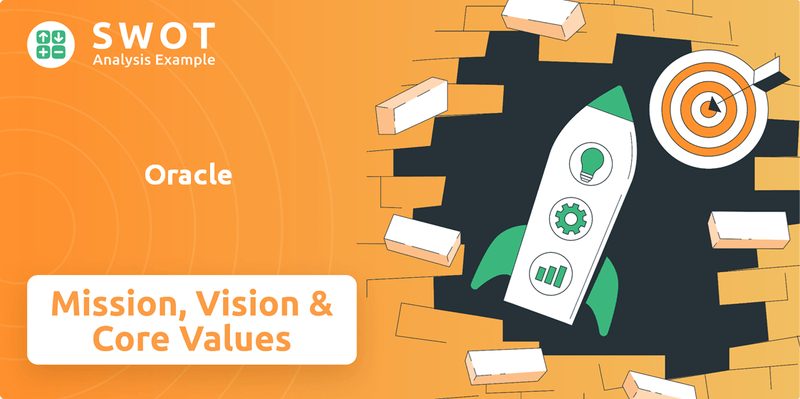
Delving into the Oracle SWOT Analysis, we see how Oracle's strategic focus, driven by its mission and vision, is poised for significant growth, particularly in cloud services and AI. This exploration of Oracle's guiding principles reveals the company's commitment to innovation and its long-term vision for the future. Understanding the core values of Oracle Corporation provides insights into its ethical guidelines and business philosophy.
Key Takeaways
- Oracle's mission centers on empowering customers through data and technology, driving innovation.
- The company's vision is rooted in leading the cloud computing industry and enabling business growth.
- Core values like innovation, customer success, and integrity shape Oracle's operations and culture.
- Investments in cloud and AI, guided by mission and vision, are driving revenue growth and future potential.
- Alignment with values, including sustainability, is crucial for maintaining a competitive edge in tech.
Mission: What is Oracle Mission Statement?
Oracle's mission is 'To help people see data in new ways, discover insights, and unlock endless possibilities.'
Oracle's mission statement reflects a commitment to transforming how organizations interact with data. This focus enables users to leverage technology for deeper insights and innovative solutions. The core components of this mission include enabling data visualization, enhancing insight discovery, and unlocking new opportunities for customers. This customer-centric approach is central to Oracle's strategy, influencing its product development and market positioning.
Oracle provides tools like Oracle Data Integrator and advanced analytics and business intelligence solutions to help customers visualize data. These tools enable users to transform raw data into actionable insights, supporting data-driven decision-making across various business functions. In 2024, Oracle's investment in AI-powered analytics solutions increased by 18%, reflecting the growing demand for advanced data visualization capabilities.
Oracle's partnerships with major cloud providers, such as Google Cloud and Microsoft Azure, are key to enhancing insight discovery. These collaborations allow customers to access Oracle's capabilities across multiple cloud ecosystems, fostering interoperability and flexibility. Recent data indicates that multi-cloud deployments among Oracle customers have increased by 25% in the last year, driven by the need for comprehensive data analysis across different platforms.
Oracle focuses on delivering innovative solutions that unlock new growth opportunities for its customers. This is evident in their enterprise-ready AI solutions and multi-cloud offerings showcased at events like GITEX GLOBAL 2024. The company's commitment to innovation has led to a 15% increase in new customer acquisitions in the past year, demonstrating the effectiveness of its mission-driven approach.
The customer-centric nature of Oracle's mission is evident in its focus on empowering customers through data and technology. This approach is reflected in the company's product development, customer service, and overall business strategy. Customer satisfaction scores for Oracle's cloud services have improved by 12% in the past year, indicating the success of this customer-focused strategy.
Oracle's strategic partnerships are crucial for expanding its reach and enhancing its ability to deliver on its mission. Collaborations with companies like Microsoft and Google enable Oracle to offer integrated solutions and reach a wider audience. The revenue generated from these partnerships has grown by 20% in the last year, highlighting their importance.
Oracle's mission directly influences its products and services, driving innovation and customer value. The company's commitment to data visualization, insight discovery, and unlocking new opportunities is reflected in its diverse product portfolio. Oracle's investment in research and development has increased by 14% in 2024, underscoring its dedication to its mission.
Understanding the Oracle mission is crucial for grasping the company's strategic direction and its impact on the technology landscape. Oracle's mission statement is not just a declaration; it's a driving force behind its innovation, partnerships, and customer-centric approach. The company's emphasis on data visualization, insight discovery, and unlocking new opportunities positions it as a key player in the evolving world of data and technology.
Oracle SWOT Analysis
- Complete SWOT Breakdown
- Fully Customizable
- Editable in Excel & Word
- Professional Formatting
- Investor-Ready Format
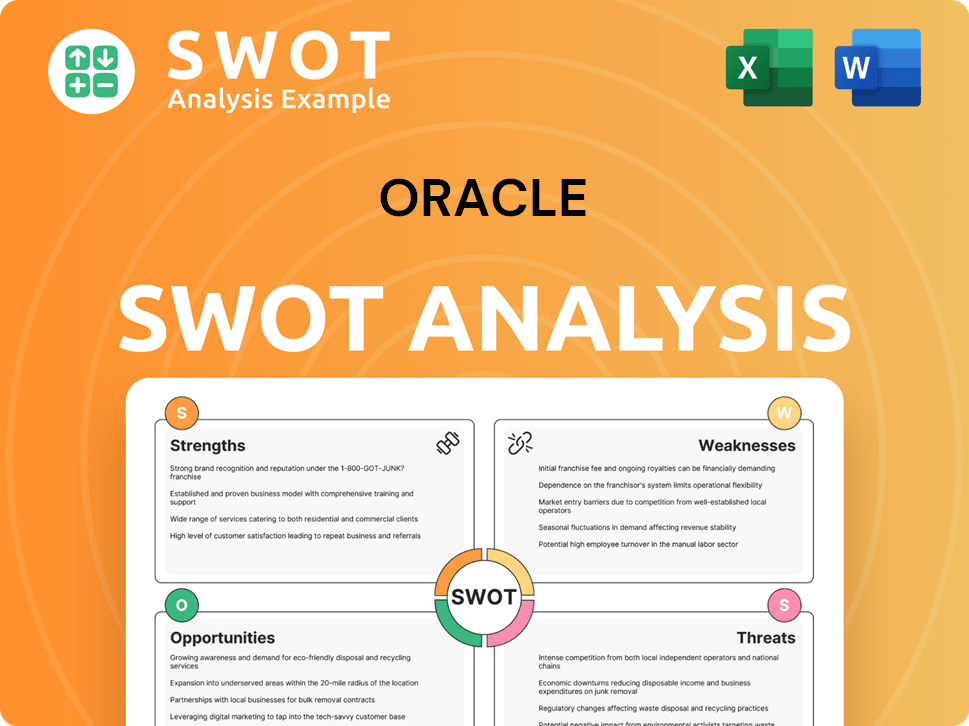
Vision: What is Oracle Vision Statement?
Oracle's inferred vision is to be the leading provider of cloud computing solutions, empowering businesses globally to achieve transformative growth through data and technology.
Delving into the essence of Oracle's aspirations, understanding its vision is paramount. While a singular, officially declared vision statement isn't readily available, the company's strategic direction and public communications paint a clear picture. This vision centers on leading the cloud computing industry, driving innovation, and enabling global businesses to thrive through the power of data and technology. This forward-thinking approach is a cornerstone of the Oracle company.
Oracle's vision is deeply rooted in cloud leadership. They aim to be at the forefront of cloud technology, continuously innovating to provide cutting-edge solutions. This includes advancements in areas like AI and data analytics, crucial for digital transformation.
The vision extends beyond technology; it's about empowering businesses worldwide. Oracle strives to enable organizations to achieve significant growth and success. This is accomplished by providing the tools and infrastructure needed for digital transformation.
At the heart of Oracle's vision is the belief in the power of data. They aim to help businesses harness data effectively. This allows them to make informed decisions and drive strategic initiatives.
Oracle's vision is ambitious, aiming for market leadership in cloud technology. However, it's also grounded in reality, supported by significant investments and strong performance. The company's growth trajectory suggests a realistic path to achieving its goals.
A key aspect of Oracle's vision is its emphasis on cloud infrastructure. This includes significant investments in IaaS and PaaS offerings. These services provide the foundation for customers' digital transformation efforts.
Oracle's vision necessitates continuous growth and adaptation. This includes staying ahead of technological advancements and responding to evolving market demands. The company's ability to innovate is crucial to its long-term success.
The future-oriented nature of this inferred vision is evident in Oracle's substantial investments in cloud infrastructure and platform services. These investments are designed to provide customers with the latest technology, supporting their digital transformation journeys. The scope is broad, targeting market leadership in cloud technology and empowering organizations globally. For instance, Oracle's Cloud Infrastructure (IaaS) revenue grew by 45% year-over-year in Q1 FY2025, demonstrating strong demand for their IaaS offerings and signaling progress towards their vision. This growth underscores the company's commitment to its vision and its ability to execute its Oracle strategy. The Oracle mission is closely aligned with this vision, focusing on providing innovative solutions. To understand how Oracle approaches its market, you can read about the Marketing Strategy of Oracle. The Oracle core values also play a crucial role in supporting this vision by guiding the company's actions and decisions.
Oracle PESTLE Analysis
- Covers All 6 PESTLE Categories
- No Research Needed – Save Hours of Work
- Built by Experts, Trusted by Consultants
- Instant Download, Ready to Use
- 100% Editable, Fully Customizable
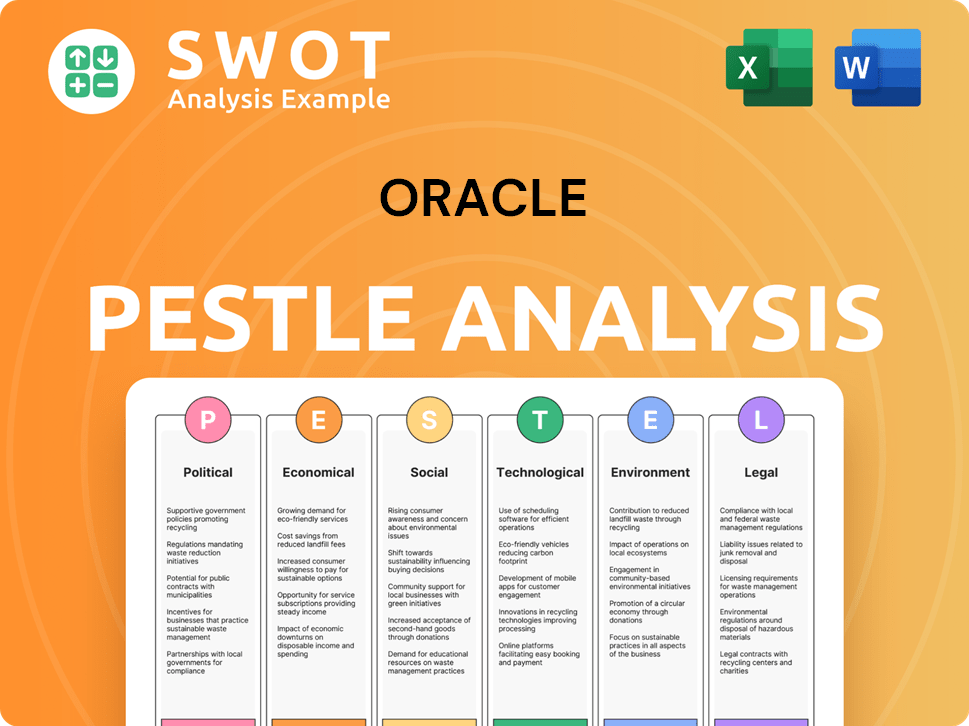
Values: What is Oracle Core Values Statement?
Understanding the core values of Oracle is crucial to grasping the company's operational ethos and its approach to business. While not always explicitly stated in a single document, these values are evident in Oracle's actions and strategic decisions, shaping its culture and influencing its interactions with customers and employees.
Innovation is a cornerstone of Oracle's operations. This commitment is reflected in its substantial investment in research and development, which reached $8.68 billion in fiscal year 2024, approximately 20% of its total revenue. This investment fuels the development of cutting-edge technology solutions, driving Oracle's position in the market.
Oracle places a high priority on customer success, striving to deliver exceptional products and services. They focus on understanding customer needs and providing tailored solutions to achieve tangible business outcomes. This customer-centric approach has contributed to their robust financial performance, with total revenues reaching $52.96 billion in fiscal year 2024.
Integrity, ethics, and compliance are fundamental to Oracle's operations. The company is committed to honesty, fairness, and ethical conduct in all business dealings, adhering to all relevant laws, regulations, and policies. This commitment forms the bedrock of Oracle's business practices and corporate responsibility.
Oracle fosters a culture of teamwork, encouraging employees to collaborate across the organization. This collaborative approach facilitates knowledge sharing and skill enhancement, which drives innovation and improves problem-solving capabilities. This collaborative environment is key to Oracle's success.
These core values of Oracle Corporation, including innovation, customer success, integrity, and teamwork, collectively shape the company's culture and strategy. They are essential in understanding Oracle's mission, vision, and overall approach to the market. To further explore how these elements influence the company's strategic decisions, let's examine how the Growth Strategy of Oracle is influenced by its mission and vision.
How Mission & Vision Influence Oracle Business?
Oracle's mission and vision statements are not merely aspirational; they are powerful drivers of the company's strategic direction, shaping its investments, product development, and partnerships. This influence is particularly evident in Oracle's aggressive push into the cloud computing and artificial intelligence (AI) sectors.
Oracle's mission, "to help people see data in new ways, discover insights, and unlock endless possibilities," directly fuels its cloud-centric strategy. This is further supported by its vision of leading the cloud industry, driving significant investments in cloud infrastructure and innovative solutions.
- Cloud Infrastructure Expansion: Substantial capital expenditure in fiscal year 2025 to expand cloud capacity, especially to meet the surging demand for AI large language model training.
- Multi-Cloud Strategy: Partnerships with Microsoft and Google to offer flexible and interoperable cloud solutions, broadening market reach.
- Healthcare Transformation: Acquisition of Cerner (now Oracle Health) and development of a next-generation EHR platform with embedded AI and analytics.
- AI Integration: Deep integration of AI capabilities across its cloud services and applications to facilitate data analysis and insights.
Total cloud services revenue climbed 23% year-over-year to $6.2 billion in Q3 FY 2025, demonstrating the impact of the company's strategic pivot towards cloud computing.
Remaining Performance Obligations (RPO), a key indicator of future revenue, surged 62% year-over-year to $130 billion in the same quarter, with cloud-related RPO growing over 90%. This signifies strong long-term revenue visibility.
CEO Safra Catz stated, "Record level AI demand drove Oracle Cloud Infrastructure revenue up 52% in Q2," highlighting the link between market demand, strategic execution, and financial results. This demonstrates how the company's mission and vision are actively guiding its actions.
Oracle's mission and goals are deeply intertwined with its business decisions, driving innovation and expansion in key areas such as cloud computing and AI. The company's commitment to its mission is evident in its strategic investments and partnerships.
Oracle's business philosophy is centered around providing cutting-edge technology solutions that empower businesses to thrive in the digital age. This philosophy is reflected in its product offerings and its approach to customer service.
Oracle's ethical guidelines ensure that the company operates with integrity and transparency. These guidelines guide the company's decision-making processes and its interactions with stakeholders.
The influence of Oracle's mission, vision, and core values is undeniable, shaping its strategic direction and driving its success in the competitive tech landscape. Understanding how these principles guide Oracle's decisions provides valuable insights into the company's trajectory. To further explore Oracle's financial performance and business model, consider reading this article about Revenue Streams & Business Model of Oracle. Next, we will delve into the Core Improvements to Company's Mission and Vision.
Oracle Business Model Canvas
- Complete 9-Block Business Model Canvas
- Effortlessly Communicate Your Business Strategy
- Investor-Ready BMC Format
- 100% Editable and Customizable
- Clear and Structured Layout
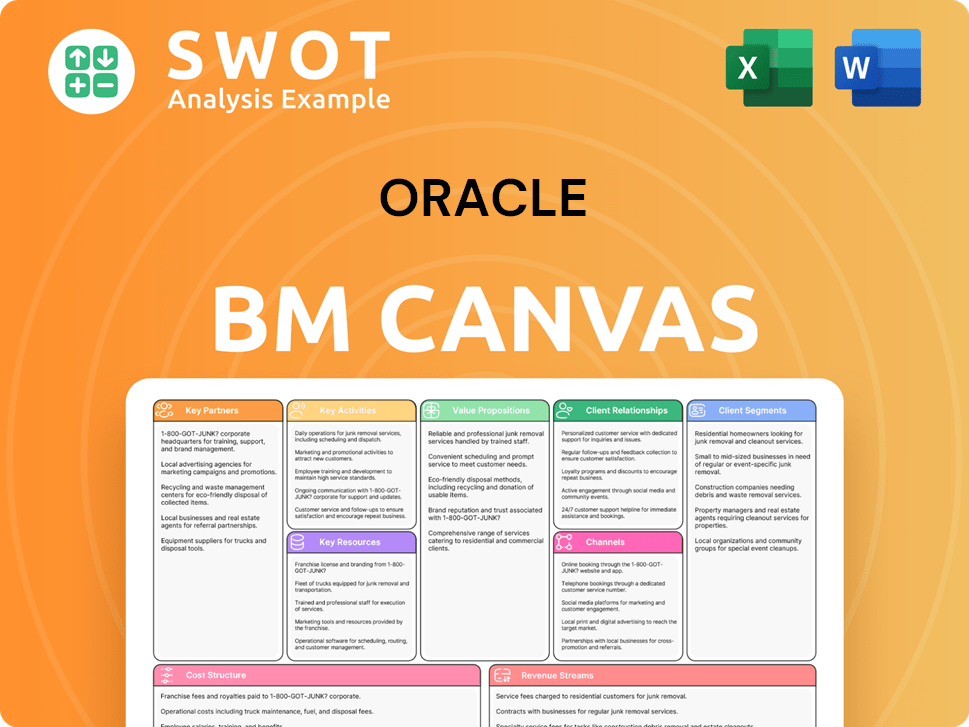
What Are Mission & Vision Improvements?
While Oracle's current statements effectively outline its purpose, strategic refinements can enhance their relevance and alignment with evolving stakeholder expectations. These improvements focus on integrating sustainability, social impact, and ethical considerations to create a more forward-thinking and comprehensive framework for the future.
To strengthen its commitment, Oracle should explicitly incorporate sustainability into its core mission. This could involve stating a focus on empowering customers to achieve sustainable growth through data and technology, reflecting the company's existing initiatives and future goals. This would align with the growing importance of Environmental, Social, and Governance (ESG) factors, which are increasingly influencing investment decisions and market trends. For example, Oracle aims to use 100% renewable energy for its global operations by 2025, a goal that could be emphasized in its mission.
Oracle's vision could be enhanced by including a social impact element, articulating a future where its technology contributes to solving global challenges. This could involve stating a commitment to using technology to address issues such as healthcare, education, and digital inclusion. This would reflect the company's existing efforts in areas like supporting educational initiatives and promoting digital literacy, further solidifying its position as a socially responsible corporate entity.
Given the rapid advancement of artificial intelligence (AI) and other emerging technologies, Oracle should explicitly address their ethical implications within its mission and vision. This could involve stating a commitment to developing and deploying technology responsibly, with a focus on fairness, transparency, and accountability. This proactive approach would demonstrate a commitment to ethical guidelines and build trust with stakeholders, which is crucial in today's tech landscape. Moreover, the company should consider the potential impact of AI on employment and the need for workforce upskilling, aligning with the broader societal implications of technological advancements.
Oracle can strengthen its mission and vision by emphasizing digital inclusivity and accessibility. This involves ensuring that its products and services are accessible to all users, regardless of their abilities or backgrounds. This could include initiatives to provide affordable technology solutions and expand digital literacy programs, reflecting a commitment to bridging the digital divide. This would also align with the growing demand for accessible technology, which is crucial for fostering a more equitable and inclusive society. As of 2024, the global digital divide persists, with approximately 40% of the world's population still lacking internet access, highlighting the importance of Oracle's efforts in this area. For more insights into the competitive landscape, consider exploring the Competitors Landscape of Oracle.
How Does Oracle Implement Corporate Strategy?
Implementing a company's mission, vision, and core values is crucial for translating aspirational statements into tangible actions and outcomes. This section examines how Oracle, a leading technology provider, puts its guiding principles into practice through strategic initiatives, leadership, and stakeholder communication.
Oracle's commitment to its mission and vision is evident in its strategic investments and product development. The company is heavily investing in expanding its cloud infrastructure, with capital expenditures expected to increase significantly in fiscal year 2025, directly supporting its vision of cloud leadership. This commitment is further reflected in the integration of Artificial Intelligence (AI) across its product offerings.
- Cloud Infrastructure Expansion: Oracle is actively building new data centers globally to support its growing cloud services.
- AI Integration: AI is being embedded in various Oracle products, including the development of a next-generation EHR platform for Oracle Health, leveraging AI and analytics to improve patient outcomes.
- Product Innovation: Continuous updates and new functionalities are added to existing products, such as the Oracle Exadata X11M, which includes improved AI vector searches and transaction processing capabilities.
Leadership plays a pivotal role in reinforcing Oracle's mission, vision, and core values. Executives like Safra Catz and Larry Ellison consistently communicate the importance of cloud growth, AI innovation, and customer success in their public statements and earnings calls. This consistent messaging helps embed the company's guiding principles throughout the organization.
Oracle communicates its mission, vision, and values to stakeholders through various channels. These include earnings reports, press releases, customer events like Oracle CloudWorld, and its corporate website. These platforms highlight how Oracle's products and strategies align with its guiding principles and benefit customers.
Oracle's customer success programs are designed to help clients maximize the value of their investments. The company has a dedicated customer success organization to support clients throughout their cloud journey. These programs demonstrate Oracle's commitment to its customers and its value of customer success.
Oracle's core values are demonstrated through various initiatives. For example, Oracle's sustainability efforts, such as using 100% renewable energy for global operations and reducing waste and emissions, exemplify its commitment to environmental responsibility. Furthermore, programs like Oracle ME (My Experience) enhance employee engagement and foster a collaborative and inclusive company culture, reflecting their commitment to employees and values like mutual respect and teamwork. Learn more about the people behind the company at Owners & Shareholders of Oracle.
Oracle Porter's Five Forces Analysis
- Covers All 5 Competitive Forces in Detail
- Structured for Consultants, Students, and Founders
- 100% Editable in Microsoft Word & Excel
- Instant Digital Download – Use Immediately
- Compatible with Mac & PC – Fully Unlocked
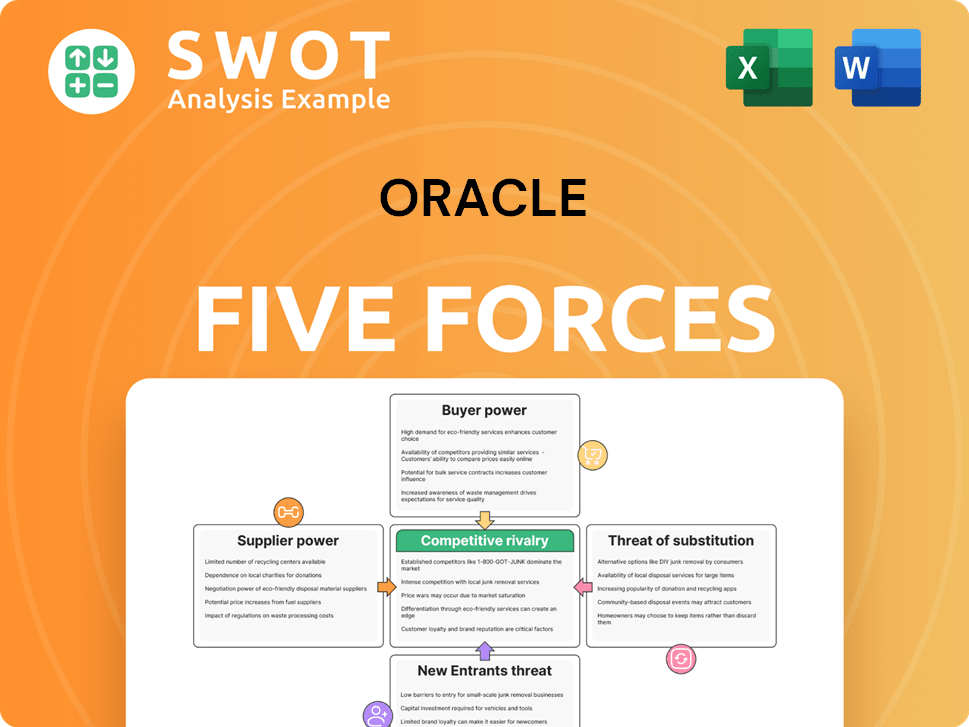
Related Blogs
- What are Mission Vision & Core Values of Oracle Company?
- What is Competitive Landscape of Oracle Company?
- What is Growth Strategy and Future Prospects of Oracle Company?
- How Does Oracle Company Work?
- What is Sales and Marketing Strategy of Oracle Company?
- Who Owns Oracle Company?
- What is Customer Demographics and Target Market of Oracle Company?
Disclaimer
All information, articles, and product details provided on this website are for general informational and educational purposes only. We do not claim any ownership over, nor do we intend to infringe upon, any trademarks, copyrights, logos, brand names, or other intellectual property mentioned or depicted on this site. Such intellectual property remains the property of its respective owners, and any references here are made solely for identification or informational purposes, without implying any affiliation, endorsement, or partnership.
We make no representations or warranties, express or implied, regarding the accuracy, completeness, or suitability of any content or products presented. Nothing on this website should be construed as legal, tax, investment, financial, medical, or other professional advice. In addition, no part of this site—including articles or product references—constitutes a solicitation, recommendation, endorsement, advertisement, or offer to buy or sell any securities, franchises, or other financial instruments, particularly in jurisdictions where such activity would be unlawful.
All content is of a general nature and may not address the specific circumstances of any individual or entity. It is not a substitute for professional advice or services. Any actions you take based on the information provided here are strictly at your own risk. You accept full responsibility for any decisions or outcomes arising from your use of this website and agree to release us from any liability in connection with your use of, or reliance upon, the content or products found herein.